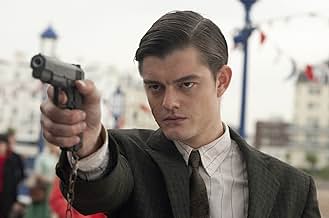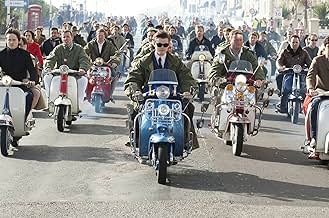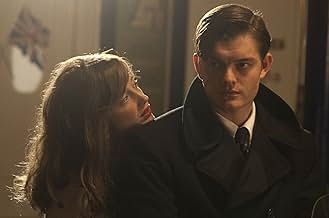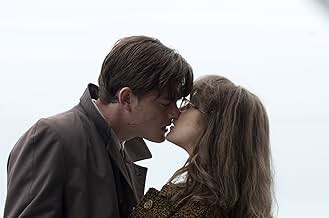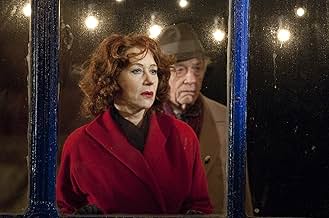IMDb रेटिंग
5.7/10
6.9 हज़ार
आपकी रेटिंग
अपनी भाषा में प्लॉट जोड़ेंCharts the headlong fall of Pinkie, a razor-wielding disadvantaged teenager with a religious death wish.Charts the headlong fall of Pinkie, a razor-wielding disadvantaged teenager with a religious death wish.Charts the headlong fall of Pinkie, a razor-wielding disadvantaged teenager with a religious death wish.
- पुरस्कार
- 1 जीत और कुल 8 नामांकन
Phil Davis
- Spicer
- (as Philip Davis)
फ़ीचर्ड समीक्षाएं
Hearing the news that John Boulting's classic 1946 adaptation of Graham Greene's novel Brighton Rock was to be remade filled with me trepidation. The current spate of mostly inferior remakes are one thing but meddling with the perfection of this archetypical gangster film is another. How can any updated version possibly replace the indelible image of the 23 year old Richard Attenborough as the flick knife wielding baby faced assassin Pinkie Brown? As filming began and rumours of a 1960s Mods and Rockers setting emerged I began to have serious doubts if this remake was really going to be a good idea! Thankfully fears that Rowan Joffe's Brighton Rock is a sanitised version of the story are quickly allayed. The relocation of Brighton Rock to the 1960s does not mean that we are entering into the trendy youth culture of the era or being taken on an adolescent search for identity. The sharp-suited posers and greasy leather clad Rockers are merely a backdrop to a much darker reality as we are taken into a terrifying world of crime, guilt and inner-torment.
Brighton Rock is concerned with the concepts of good versus evil, sin and redemption they were present in Greene's novel, the 1946 adaptation and once again are central in Rowan Joffe's remake. However, additional scenes and alterations to the 2010 update mean that Pinkie's progressively violent behaviour is almost justified. In the exhilarating opening sequence Pinkie witnesses the brutal murder of the gang's original leader Kite when Fred Hale slashes his throat. When Pinkie sees one of the few role models in his life burbling and drowning in his own blood revenge it seems is not only on the cards but unavoidable. This kind of black and white, eye for an eye, morality detracts from the original story where Pinkie Brown's vicious streak appeared to be innate and a product of original sin. The character of Ida Arnold (Dame Helen Mirren) also has undergone a significant adjustment. In opposition to the Catholicism of Pinkie and Rose the pleasure seeking Ida was concerned only with the here and now. Mirren's portrayal plays these aspects down resulting in a more serious role and a lessening of the story's theological study.
As with Attenborough before him Sam Riley's Pinkie is intense, dangerous and teeters on the edge of sanity. If anything in Joffe's adaptation Pinkie Brown undergoes a broader transformation than before as greater emphasis being placed upon his journey from a nervous lackey to maniacal gang leader. Unfortunately the 30 year old Riley he does not resemble a juvenile delinquent. Therefore the shy adolescent awkwardness that Pinkie displays towards adulthood and in particular his relationship with Rose, (conveyed so expertly by Attenborough,) is absent.
Andrea Riseborough gives an outstanding performance as Rose she too goes on a psychological journey from being a naive and mousey youngster to an assertive young woman attracted to Pinkie's confidence and menace. The scene in which Pinkie in effect buys Rose from her abusive father for £150 adds a social realist dimension to the film uncovering the lack of options available to a young working-class woman in 'sixties Britain. The squalid surroundings of Pinkie and Rose's flat complete with peeling wallpaper, scuffed furniture and squeaky floorboards are also reminiscent of a Kitchen Sink drama. There is some impressive cinematography by John Mathieson as the camera pans from the threatening crashing waves on Brighton Beach to the scenic seaside cafés foreshadowing the storm that is building. The swelling orchestral soundtrack also adds to the heightened sense of panic and drama. The tea rooms, arcades and dance-halls of 1960s Brighton are also accurately recreated as are the neglected interiors of the boarding houses. And yet There is something oddly unreal about Joffe's Brighton Rock partly down to the unnecessary time shift which does nothing but confuse the audience. The film's characters seem stuck in the wrong era originating as they do from austere post-war Britain both in appearance and behaviour. Using the Mods and Rockers backdrop and casting of Philip Davis, (who appeared in Quadrophenia,) as Spicer turns the movie into a pastiche of sorts leaving us with a souped-up hyper-reality. This is Brighton as seen through the eyes of the cinema goer not the world of Graham Greene's novel. Dark, menacing and suspenseful Rowan Joffe's Brighton Rock is well worth seeing it is just unfortunate that the film is not as good as the sum of its parts.
Brighton Rock is concerned with the concepts of good versus evil, sin and redemption they were present in Greene's novel, the 1946 adaptation and once again are central in Rowan Joffe's remake. However, additional scenes and alterations to the 2010 update mean that Pinkie's progressively violent behaviour is almost justified. In the exhilarating opening sequence Pinkie witnesses the brutal murder of the gang's original leader Kite when Fred Hale slashes his throat. When Pinkie sees one of the few role models in his life burbling and drowning in his own blood revenge it seems is not only on the cards but unavoidable. This kind of black and white, eye for an eye, morality detracts from the original story where Pinkie Brown's vicious streak appeared to be innate and a product of original sin. The character of Ida Arnold (Dame Helen Mirren) also has undergone a significant adjustment. In opposition to the Catholicism of Pinkie and Rose the pleasure seeking Ida was concerned only with the here and now. Mirren's portrayal plays these aspects down resulting in a more serious role and a lessening of the story's theological study.
As with Attenborough before him Sam Riley's Pinkie is intense, dangerous and teeters on the edge of sanity. If anything in Joffe's adaptation Pinkie Brown undergoes a broader transformation than before as greater emphasis being placed upon his journey from a nervous lackey to maniacal gang leader. Unfortunately the 30 year old Riley he does not resemble a juvenile delinquent. Therefore the shy adolescent awkwardness that Pinkie displays towards adulthood and in particular his relationship with Rose, (conveyed so expertly by Attenborough,) is absent.
Andrea Riseborough gives an outstanding performance as Rose she too goes on a psychological journey from being a naive and mousey youngster to an assertive young woman attracted to Pinkie's confidence and menace. The scene in which Pinkie in effect buys Rose from her abusive father for £150 adds a social realist dimension to the film uncovering the lack of options available to a young working-class woman in 'sixties Britain. The squalid surroundings of Pinkie and Rose's flat complete with peeling wallpaper, scuffed furniture and squeaky floorboards are also reminiscent of a Kitchen Sink drama. There is some impressive cinematography by John Mathieson as the camera pans from the threatening crashing waves on Brighton Beach to the scenic seaside cafés foreshadowing the storm that is building. The swelling orchestral soundtrack also adds to the heightened sense of panic and drama. The tea rooms, arcades and dance-halls of 1960s Brighton are also accurately recreated as are the neglected interiors of the boarding houses. And yet There is something oddly unreal about Joffe's Brighton Rock partly down to the unnecessary time shift which does nothing but confuse the audience. The film's characters seem stuck in the wrong era originating as they do from austere post-war Britain both in appearance and behaviour. Using the Mods and Rockers backdrop and casting of Philip Davis, (who appeared in Quadrophenia,) as Spicer turns the movie into a pastiche of sorts leaving us with a souped-up hyper-reality. This is Brighton as seen through the eyes of the cinema goer not the world of Graham Greene's novel. Dark, menacing and suspenseful Rowan Joffe's Brighton Rock is well worth seeing it is just unfortunate that the film is not as good as the sum of its parts.
Sometimes it's a character you liked that attracts, like the role Philip Davis played in Midsomer Murders. Other times it's to see a great star like Helen Mirren.
Whatever the reason, it's always good to see a film based on a Graham Greene novel, like The Third Man, This Gun for Hire, The Quiet American, and many more.
A young Richard Attenborough played in this movie in the 40's, here is falls to Sam Riley (Control, Maleficent) to play the lead. He is capably assisted by Andrea Riseborough (Oblivion, Shadow Dancer), as the waitress he marries to keep her from testifying as a witness.
A good neo-noir with contributions from William Hurt and Nonso Anozie (The Grey, Game of Thrones).
Whatever the reason, it's always good to see a film based on a Graham Greene novel, like The Third Man, This Gun for Hire, The Quiet American, and many more.
A young Richard Attenborough played in this movie in the 40's, here is falls to Sam Riley (Control, Maleficent) to play the lead. He is capably assisted by Andrea Riseborough (Oblivion, Shadow Dancer), as the waitress he marries to keep her from testifying as a witness.
A good neo-noir with contributions from William Hurt and Nonso Anozie (The Grey, Game of Thrones).
I decided to watch Brighton Rock after I had heard good things about it and I thought it would be interesting to watch. It seemed different to other films and in a genre of it's own. It was not a bad film but at the same time it wasn't the best,I would say stick to the novel and original. The start was very slow. Helen Mirren and Sam Riley gave amazing performances and owned the film, while Andrea Riseborough gave a great performance as the annoying and needy Rose. The performances and cast make up for the lack of excitement. There are a few twist within and some action scenes that make the film that bit more interesting. It's a rememberable film but I wouldn't plan on watching it again.
I went to see this film with some trepidation. The original Graham Greene novel is very good and one of my favourites. The original film from 1947 was also extremely good, with Richard Attenborough as an unlikely but splendid villain. However this version was excellent. The fact that it had been updated to the 60s, which had worried me a little, worked well. Of course it did not have the period feel, but the aggression, violence and fighting for territory of the Mods and Rockers (which I remember well) echoed beautifully the behaviour of the gangsters and gave the opportunity for some very effective scenes visually. The acting I found completely plausible, with Phill Davies, John Hurt, Sam Riley and Andrea Riseborough all giving authentic portrayals. Helen Mirren, perhaps, looked a little too glamorous physically, but her acting was fine. Brighton itself was a wonderful additional character in all this. The contrast between the somewhat mindless hedonism of the holiday makers and the violent and ugly activities of the underworld was extremely effective and the use of the landscape beautiful and horrific in equal measure. The theme of sin, guilt and Catholicism was probably not dealt with as interestingly as in the novel, but that is a frequent limitation of the medium of film. Why on earth the makers of the film felt that they were entitled to "improve" on Graham Greene's ending I do not know. But it did not spoil my overall judgement that this was a very good film. I hope it will inspire those who have not already done so to read the novel.
BRIGHTON ROCK is a British remake of the 1947 brilliant film noir based on the novel by Graham Greene an adapted for the screen by Graham Greene and Terrance Rattigan. This BRIGHTON ROCK has been updated from the original 1930s setting to the 1960s and the screenplay is by Rowan Joffe (who also directs) - tough competition with the original writers! The result is a dark film that relies on performances by some actors who are not up to the task and makes them seem even more weak by the presence of such brilliant actors in smaller roles as Helen Mirren, John Hurt, Philip Davis and Andrea Riseborough.
The story takes place in 1964 in Brighton, once a quiet seaside town, is suddenly overrun by gangs of sharp suited Mods and greasy Rockers looking for a riot. Looking to be the top Mod gangster, Pinkie Brown (Sam Riley) will stop at nothing to be the biggest name in the crime world - bigger than the competitor Colleoni (Andy Serkis). Pinkie witnesses the vicious death of fellow Mod Kite (Goeff Bell) and is determined to kill the perpetrator Hale (Sean Harris). Pinkie's ruthless and violent ambition takes over his mission and when he discovers that a waitress named Rose (Andrea Riseborough) who works at Snows, a café run by Ida (Helen Mirren), is involved tangentially in the murders, Pinkie decides to court the plain Jane Rose, knowing that if he marries her she cannot testify against him should she discover Pinkie's guilt in the murders. Ida had a 'connection' with Hale and sees through the veils of deceit Pinkie is placing on the innocent Rose, and she and her longtime friend Phil (John Hurt) undermine Pinkie's plans. Pinkie marries Rose - a gesture that secures Rose's fascination and new love for Pinkie - to keep her from testifying against him. As factors around the conflicts between the two gangs tighten and Pinkie fears for his end, he convinces his new bride to take part in a mutual suicide, an act that has a surprising end.
What is missing in this updated adaptation is Graham Greene's important emphasis on the theme of sin, guilt and Catholicism: there are attempts to bring these concepts into the script but they become of lesser importance than the action and dark evocation of a period piece. There mood is well described by the cinematography of John Mathieson, but the single most effective aspect of this film is the brilliant music score by the gifted British composer Martin Phipps, godson of Benjamin Britten. Were there not an original film for comparison the film would likely be better accepted. But for those who are ardent fans of the novels of Graham Greene this film adaptation will likely disappoint. It is currently available On Demand and simultaneously in theaters before the DVD is released here.
Grady Harp
The story takes place in 1964 in Brighton, once a quiet seaside town, is suddenly overrun by gangs of sharp suited Mods and greasy Rockers looking for a riot. Looking to be the top Mod gangster, Pinkie Brown (Sam Riley) will stop at nothing to be the biggest name in the crime world - bigger than the competitor Colleoni (Andy Serkis). Pinkie witnesses the vicious death of fellow Mod Kite (Goeff Bell) and is determined to kill the perpetrator Hale (Sean Harris). Pinkie's ruthless and violent ambition takes over his mission and when he discovers that a waitress named Rose (Andrea Riseborough) who works at Snows, a café run by Ida (Helen Mirren), is involved tangentially in the murders, Pinkie decides to court the plain Jane Rose, knowing that if he marries her she cannot testify against him should she discover Pinkie's guilt in the murders. Ida had a 'connection' with Hale and sees through the veils of deceit Pinkie is placing on the innocent Rose, and she and her longtime friend Phil (John Hurt) undermine Pinkie's plans. Pinkie marries Rose - a gesture that secures Rose's fascination and new love for Pinkie - to keep her from testifying against him. As factors around the conflicts between the two gangs tighten and Pinkie fears for his end, he convinces his new bride to take part in a mutual suicide, an act that has a surprising end.
What is missing in this updated adaptation is Graham Greene's important emphasis on the theme of sin, guilt and Catholicism: there are attempts to bring these concepts into the script but they become of lesser importance than the action and dark evocation of a period piece. There mood is well described by the cinematography of John Mathieson, but the single most effective aspect of this film is the brilliant music score by the gifted British composer Martin Phipps, godson of Benjamin Britten. Were there not an original film for comparison the film would likely be better accepted. But for those who are ardent fans of the novels of Graham Greene this film adaptation will likely disappoint. It is currently available On Demand and simultaneously in theaters before the DVD is released here.
Grady Harp
क्या आपको पता है
- ट्रिवियाPhil Davis (Frank Spicer) previously played the mod Chalky in Quadrophenia (1979), which was likewise set in Brighton in 1964.
- गूफ़When Rose opens the record player, it has a modern British plug on it. In 1960s Britain plug pins were round. Safety switches wall sockets would not have been in place at this time, either.
- कनेक्शनFeatured in Breakfast: 28 जनवरी 2011 को प्रसारित एपिसोड (2011)
टॉप पसंद
रेटिंग देने के लिए साइन-इन करें और वैयक्तिकृत सुझावों के लिए वॉचलिस्ट करें
- How long is Brighton Rock?Alexa द्वारा संचालित
विवरण
- रिलीज़ की तारीख़
- कंट्री ऑफ़ ओरिजिन
- आधिकारिक साइट
- भाषा
- इस रूप में भी जाना जाता है
- Băng Đảng Brighton
- फ़िल्माने की जगहें
- उत्पादन कंपनियां
- IMDbPro पर और कंपनी क्रेडिट देखें
बॉक्स ऑफ़िस
- बजट
- $1,20,00,000(अनुमानित)
- US और कनाडा में सकल
- $2,29,653
- US और कनाडा में पहले सप्ताह में कुल कमाई
- $32,774
- 28 अग॰ 2011
- दुनिया भर में सकल
- $29,13,599
- चलने की अवधि1 घंटा 51 मिनट
- रंग
- ध्वनि मिश्रण
- पक्ष अनुपात
- 2.39 : 1
इस पेज में योगदान दें
किसी बदलाव का सुझाव दें या अनुपलब्ध कॉन्टेंट जोड़ें






